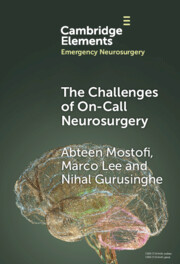Element contents
The Challenges of On-Call Neurosurgery
Published online by Cambridge University Press: 23 October 2023
Summary
- Type
- Element
- Information
- Online ISBN: 9781009384520Publisher: Cambridge University PressPrint publication: 16 November 2023
References
- 8
- Cited by

